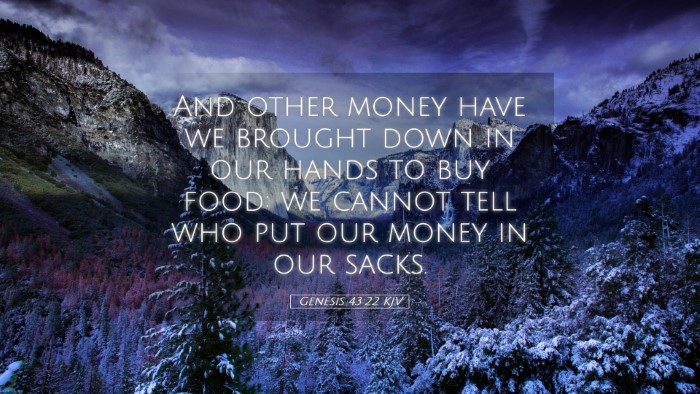Commentary on Genesis 43:22
Bible Verse: Genesis 43:22 - "And other money which brought again in the mouth of our sacks, we brought again in our hand; for we cannot tell who put our money in our sacks."
Introduction
The narrative surrounding Joseph and his brothers is a profound element of the Genesis account, encapsulating themes of providence, reconciliation, and divine testing. In Genesis 43:22, we encounter a moment of anxiety and confession as the brothers approach their second visit to Egypt, where they fortuitously find their previous payment inadvertently returned. This verse acts as a pivotal point in the unfolding drama, rich in theological implications and lessons for today’s believers.
Contextual Background
The broader context surrounding Genesis 43 includes Jacob’s grief over the presumed loss of his beloved son Joseph, the persistent famine in the land, and the brothers' hesitance to return to Egypt without their youngest brother Benjamin. Joseph's disguised identity as the governor of Egypt heightens the tension, as the brothers must confront their past actions of selling him into slavery. This verse reflects their tumultuous emotions and foreshadows the eventual revelation and reconciliation.
Insights from Public Domain Commentaries
Matthew Henry's Commentary
Matthew Henry emphasizes the brothers' integrity and their moral dilemma. He notes that the return of the money manifests God's providence and mercy, highlighting a key theme in the chapter - the anxiety and distress resulting from their past guilt and the quest for honesty in their dealings. Henry remarks:
"They had been honest, though they had entirely relied upon God's wisdom, yet the uncertainty of how their host might respond troubled them."
Henry delves into the psychological burden carried by the brothers. Despite their initial evil towards Joseph, they now grapple with an opportunity for honesty, which reflects a potential transformation in their character. The return of the money serves as both a test of their integrity and an invitation to deeper reconciliation within the family dynamics.
Albert Barnes' Notes
Albert Barnes provides further theological reflection on the implications of the brothers’ statement. He mentions that their acknowledgment of returning the money is not merely a recounting of events but an assertion of their integrity amid fear:
"Their fear is a response to the divine dealings they perceive; they understand their position as both vulnerable and in need of divine favor."
Barnes highlights the importance of fear and recognition of God’s sovereignty in situations of uncertainty. He suggests that this moment reflects the brothers' growth in understanding their moral failings and their reliance on divine oversight in their affairs. This response reveals how their past actions align with their present realities, ultimately pushing them towards repentance and restoration.
Adam Clarke's Commentary
Adam Clarke brings to light the historical and cultural context of monetary transactions in ancient Egypt, asserting the brothers' adherence to honesty in trade. He indicates that their candidness about returning the found money illustrates a critical moral stance:
"Their willingness to disclose this unusual circumstance demonstrates a heightened sense of accountability and a desire to please their host, which is essential in the eyes of God."
Clarke posits that this choice to be transparent indicates a shift from deception to an earnest attempt at integrity, signifying potential growth in their character and relationship with one another. He detects the layers of confession and recognition of their faults, indicating that God was orchestrating their circumstances toward a redemptive end.
Theological Reflections
This verse, encapsulating the brothers’ concerns, offers several theological reflections that are pertinent to contemporary readers:
- Divine Providence: The narrative illustrates how God orchestrates events—even confusion and fear—to bring individuals closer to Him and His intended purpose. What seems adverse can lead to a greater good.
- Integrity and Accountability: The brothers’ decision to return the money highlights the importance of integrity in interactions. God calls His people to uphold honesty and transparency, even in dire situations.
- Repentance and Growth: This moment represents a crucial turning point in the brothers’ lives—a chance to confront their past and strive for reconciliation. Their willingness to confront their guilt suggests a movement towards true repentance.
- The Nature of Fear: The brothers’ fear represents a common human experience when faced with the consequences of one’s actions. Still, it also reflects an opportunity to recognize God's hand in their lives, guiding them through their fears towards grace.
Application for Pastors and Theologians
For pastors and theologians, Genesis 43:22 provides rich material for exploration in areas such as ethics, reconciliation, and pastoral care. It serves as a reminder that:
- Leaders should encourage honesty within their congregations and promote a culture of transparency.
- The journey toward reconciliation often requires confronting past sins, a theme that resonates deeply in the gospel narrative of forgiveness.
- Believers are called to recognize God's providential hand even in unsettling circumstances, trusting that He can bring good from difficult situations.
Conclusion
Genesis 43:22 serves as a poignant reminder of the complexities of human relationships and the divine orchestration behind them. Through the lens of public domain commentaries, we see a multifaceted interpretation that encourages believers to engage earnestly with their history, seek integrity, and yield to God’s unwavering guidance amidst life’s trials. By studying and reflecting on such passages, pastors, students, and scholars can deepen their understanding of biblical truths and their practical applications in life today.


